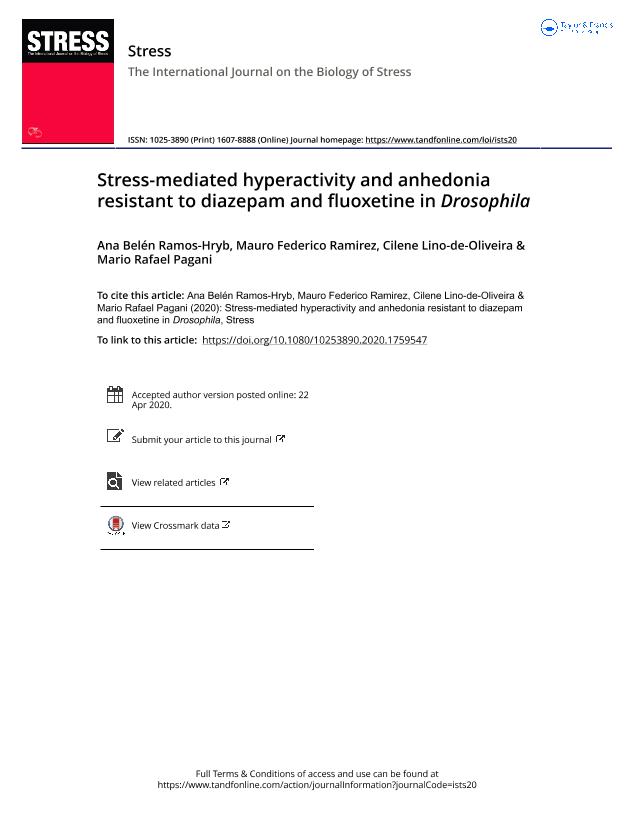Artículo
Stress-mediated hyperactivity and anhedonia resistant to diazepam and fluoxetine in Drosophila
Fecha de publicación:
05/2020
Editorial:
Taylor & Francis Ltd
Revista:
Stress
ISSN:
1025-3890
Idioma:
Inglés
Tipo de recurso:
Artículo publicado
Clasificación temática:
Resumen
Distresses may induce behavioral phenotypes constituting heuristic models for psychopharmacology studies. In several species, including Drosophila, antidepressants counteract stress-induced phenotypes allowing the use of these models to test new psychoactive drugs. Here, we developed a novel and time-efficient protocol to provoke stress-induced phenotypes in Drosophila for the study of psychopharmacological agents. In the first experiment, flies (n = 12/groups) were exposed to a random-sequence of different types of stresses during nearly 24 h (including social isolation, fasting, heat, and electric shock), a protocol named short-term variable stress (SVS). Second, flies were exposed to a single stressful stimulus (social isolation, fasting, heat shock or electric shock, n = 12/groups). Next, flies submitted to SVS protocol were treated with vehicle, diazepam or fluoxetine (n = 12/groups). At the end of the stress protocols, behavioral phenotypes were evaluated in the open field (OF) and sucrose preference tests. In comparison to the unstressed group, flies exposed to SVS exhibited hyperactivity, as well as shorter times exploring the boundaries of the OF. In contrast to fasting stress, SVS reduced sucrose preference in flies. By analyzing the effects of individual stimuli on fly behavior, fasting and electric shock appear to be the predominant influences on the SVS-induced behaviors. Although fluoxetine or diazepam reduced the initial locomotor activity of flies, no treatment prevented the sequelae of SVS. Altogether, this study provides a time-efficient model system for the study of stress-mediated hyperactivity and anhedonia-like state resistant to fluoxetine and diazepam. The applications of SVS in Drosophila to preclinical psychopharmacology require further studies.LAY SUMMARY Exposition to unpredictable stress plays a significant role in psychiatric disorder’s onset. Behavioral traits of these disorders can be partially modeled in rodents aimed at developing psychopharmacological therapies. However, studies in rodents were questioned by ethical issues. Focused on 3Rs principles, we developed a preclinical model for stress and psychopharmacology research in Drosophila. Variable stress induced behavioral alterations, including hyperlocomotion and reduced preference for sucrose in flies. However, behavioral alterations were resistant to fluoxetine and diazepam.
Archivos asociados
Licencia
Identificadores
Colecciones
Articulos(IFIBIO HOUSSAY)
Articulos de INSTITUTO DE FISIOLOGIA Y BIOFISICA BERNARDO HOUSSAY
Articulos de INSTITUTO DE FISIOLOGIA Y BIOFISICA BERNARDO HOUSSAY
Citación
Ramos Hryb, Ana Belen; Ramirez, Mauro Federico; Lino de Oliveira, Cilene; Pagani, Mario Rafael; Stress-mediated hyperactivity and anhedonia resistant to diazepam and fluoxetine in Drosophila; Taylor & Francis Ltd; Stress; 24; 1; 5-2020; 96-106
Compartir
Altmétricas




